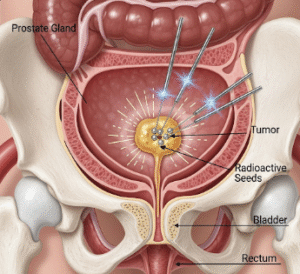Overview
Bipolar Disorder is a chronic mental health condition characterized by extreme fluctuations in mood, energy, and activity levels. Individuals experience periods of mania or hypomania, where they feel unusually euphoric, energetic, or irritable, and periods of depression, marked by sadness, fatigue, and loss of interest. These mood swings can significantly impact personal, social, and professional life.
In Korea, psychiatric hospitals and mental health clinics offer advanced diagnostic tools, psychotherapy, and pharmacological treatments for bipolar disorder. Early diagnosis and integrated care are crucial for stabilizing mood episodes, reducing relapse, and improving quality of life.
What is Bipolar Disorder?
Bipolar Disorder is classified into several types based on the pattern and severity of mood episodes:
- Bipolar I Disorder: Defined by at least one manic episode, often with depressive episodes
- Bipolar II Disorder: Characterized by hypomanic episodes alternating with major depression, without full mania
- Cyclothymic Disorder: Chronic, mild mood fluctuations that do not meet full criteria for mania or major depression
- Other Specified Bipolar and Related Disorders: Cases that do not fit standard categories but involve mood swings
The disorder involves dysregulation of brain chemicals, particularly neurotransmitters such as dopamine, serotonin, and norepinephrine, which influence mood, energy, and cognition.
Symptoms
Symptoms vary depending on whether the individual is experiencing mania, hypomania, or depression:
Manic/Hypomanic symptoms:
- Inflated self-esteem or grandiosity
- Increased energy and activity levels
- Reduced need for sleep
- Rapid speech or racing thoughts
- Impulsivity or risky behavior (e.g., excessive spending, reckless driving)
- Irritability or agitation
Depressive symptoms:
- Persistent sadness or hopelessness
- Fatigue or low energy
- Difficulty concentrating or making decisions
- Loss of interest in activities once enjoyed
- Changes in appetite or sleep patterns
- Thoughts of death or suicide in severe cases
Causes
The exact cause of bipolar disorder is not fully understood, but it is believed to result from a combination of:
- Genetic factors: Family history increases risk, suggesting hereditary predisposition
- Neurochemical imbalances: Dysregulation of neurotransmitters affecting mood and behavior
- Brain structure and function: Abnormalities in the prefrontal cortex and limbic system
- Environmental factors: Stressful life events, trauma, or substance abuse can trigger episodes
Risk Factors
- Family history of bipolar disorder or other mood disorders
- Early life stress, trauma, or abuse
- Substance abuse, including alcohol or recreational drugs
- Periods of significant stress or major life changes
- Sleep disruption or irregular sleep patterns
Complications
Bipolar disorder can lead to significant complications if untreated:
- Suicide risk: Elevated during depressive and mixed episodes
- Substance abuse: Increased likelihood of alcohol or drug dependency
- Relationship difficulties: Strain in personal and professional relationships
- Financial or legal problems due to impulsive behavior
- Cognitive impairment affecting memory, attention, and executive function
- Medical comorbidities such as obesity, cardiovascular disease, and diabetes
Prevention
While bipolar disorder cannot be fully prevented due to its genetic basis, certain strategies can reduce the severity and frequency of episodes:
- Early recognition and treatment of mood symptoms
- Maintaining regular sleep and daily routines
- Stress management through mindfulness, yoga, or therapy
- Avoiding alcohol and recreational drugs
- Education for patients and families about early warning signs and coping strategies
Treatment Options in Korea
Diagnosis
Korean psychiatric clinics use comprehensive assessments to diagnose bipolar disorder:
- Clinical interviews assessing mood history, family history, and behavioral patterns
- Standardized rating scales such as the Young Mania Rating Scale (YMRS) or Mood Disorder Questionnaire (MDQ)
- Medical evaluation to rule out thyroid or neurological conditions that mimic mood disorders
- Psychosocial assessments to identify stressors and functional impairment
Psychotherapy
Psychotherapy is a critical component of bipolar disorder treatment:
- Cognitive Behavioral Therapy (CBT): Helps patients manage mood symptoms and recognize triggers
- Interpersonal and Social Rhythm Therapy (IPSRT): Focuses on stabilizing daily routines and relationships
- Family-focused therapy: Educates family members to support the patient and reduce relapse risk
- Psychoeducation: Teaches self-monitoring of moods, early warning signs, and coping strategies
Medical Management
Medication management is central to stabilizing mood episodes:
- Mood stabilizers: Lithium is commonly used to prevent both manic and depressive episodes
- Anticonvulsants: Valproate, lamotrigine, or carbamazepine for mood stabilization
- Atypical antipsychotics: Quetiapine, olanzapine, or risperidone for acute mania or mixed episodes
- Antidepressants: Used cautiously with mood stabilizers to treat depressive episodes without triggering mania
Rehabilitation and Support
- Regular psychiatric follow-up for medication monitoring and dose adjustment
- Support groups and community mental health programs in Korea for peer encouragement
- Lifestyle modifications, including balanced diet, exercise, and sleep hygiene
- Crisis intervention plans for managing severe mood episodes or suicidal thoughts
Prognosis
With early diagnosis, consistent treatment, and lifestyle management, individuals with bipolar disorder in Korea can achieve stable mood, improved functioning, and high quality of life. While bipolar disorder is chronic, modern psychiatric care and psychosocial support significantly reduce the frequency and severity of mood episodes. Long-term adherence to medication, therapy, and monitoring is essential for sustained recovery and prevention of relapse.













